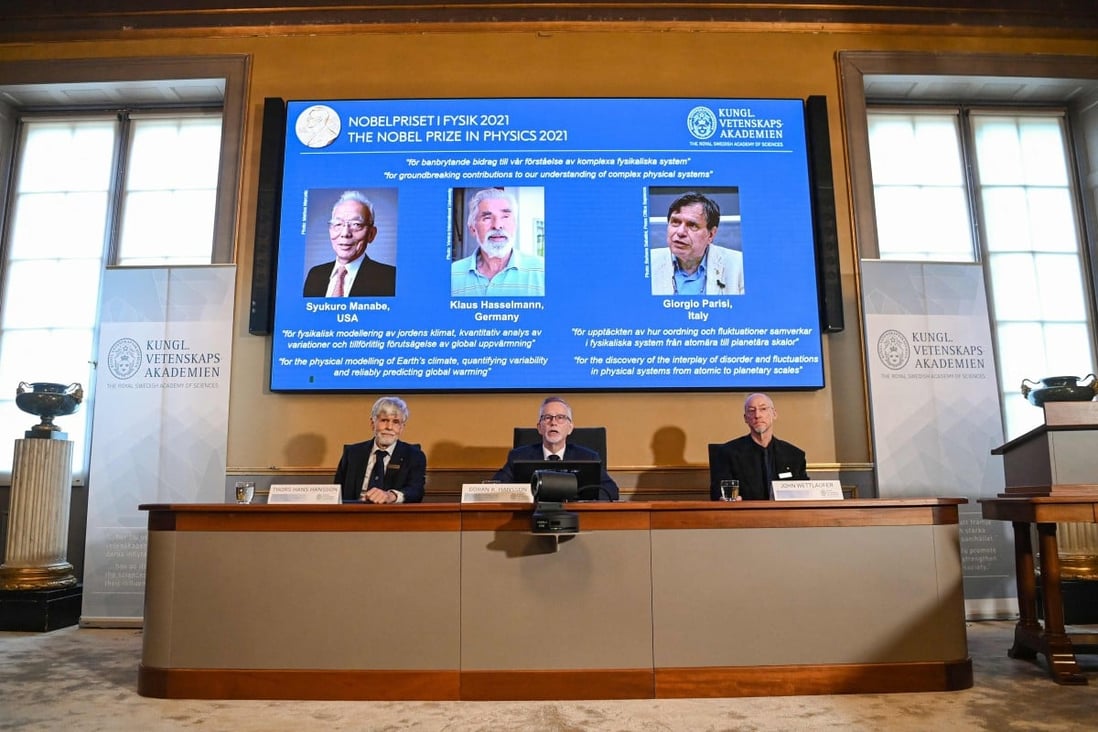
Three scientists won the Nobel Prize for physics on Tuesday for work that found order in seeming disorder, helping to explain and predict complex forces of nature, including expanding our understanding of climate change.
Syukuro Manabe, originally from Japan, and Klaus Hasselmann of Germany were cited for their work in “the physical modelling of Earth’s climate, quantifying variability and reliably predicting global warming.”
The second half of the prize was awarded to Giorgio Parisi of Italy for “the discovery of the interplay of disorder and fluctuations in physical systems from atomic to planetary scales.”
All three work on what are known as “complex systems,” of which climate is just one example.
The judges said Manabe, 90, and Hasselmann, 89, “laid the foundation of our knowledge of the Earth’s climate and how human actions influence it.
BREAKING NEWS:
The Royal Swedish Academy of Sciences has decided to award the 2021 #NobelPrize in Physics to Syukuro Manabe, Klaus Hasselmann and Giorgio Parisi “for groundbreaking contributions to our understanding of complex physical systems.” pic.twitter.com/At6ZeLmwa5— The Nobel Prize (@NobelPrize) October 5, 2021
Starting in the 1960s, Manabe demonstrated how increases in the amount of carbon dioxide in the atmosphere would increase global temperatures, laying the foundations for current climate models.
About a decade later, Hasselmann created a model that linked weather and climate, helping explain why climate models can be reliable despite the seemingly chaotic nature of the weather. He also developed ways to look for specific signs of human influence on the climate.
Parisi, 73, “built a deep physical and mathematical model” that made it possible to understand complex systems in fields as different as mathematics, biology, neuroscience and machine learning.
His work originally focused on so-called spin glass, a type of metal alloy in which the atoms are arranged in a way that changes the material’s magnetic properties in apparently random ways that baffled scientists. Parisi was able to discover hidden patterns that explained this behaviour, theories that could be applied to other fields of research, too.
After the announcement, Parisi said that “it’s very urgent that we take very strong decisions and move at a very strong pace” in tackling climate change. “It’s clear for future generations that we have to act now,” he said.
It is common for several scientists who work in related fields to share the prize.
Five things to know about the Nobel Prizes
The winners were announced on Tuesday by Goran Hansson, secretary general of the Royal Swedish Academy of Sciences.
The more than century-old prize is awarded by the Royal Swedish Academy of Sciences and is worth 10 million Swedish crowns (US$1.15 million).
For the past two years, the academy has honoured findings in the field of astronomy, leading watchers to speculate it was due for a change of field.
“The discoveries being recognised this year demonstrate that our knowledge about the climate rests on a solid scientific foundation, based on a rigorous analysis of observations,” Thors Hans Hansson, chair of the Nobel Committee for Physics said.
In 2019, James Peebles of Canada and the US was given the award for discoveries explaining the universe’s evolution after the Big Bang, together with Michel Mayor and Didier Queloz of Switzerland for the first discovery of an exoplanet.
Last year, the award went to Britain’s Roger Penrose, Reinhard Genzel of Germany and US scientist Andrea Ghez for their discoveries about one of the most exotic phenomena in the universe, the black hole.
While the 2020 award was handed out as the pandemic raged, this is the first time the entire selection process has taken place under the shadow of Covid-19.
On Monday, US scientists David Julius and Ardem Patapoutian won the Nobel Medicine Prize for discoveries on receptors for temperature and touch.
The Nobel season continues on Wednesday with chemistry, followed by the much-anticipated prizes for literature on Thursday and peace on Friday before the economics prize winds things up on Monday, October 11.
With the exception of economics, the prizes were endowed by Swedish industrialist Alfred Nobel (1833-96), the inventor of dynamite.
Reporting by Associated Press, Agence France-Presse







